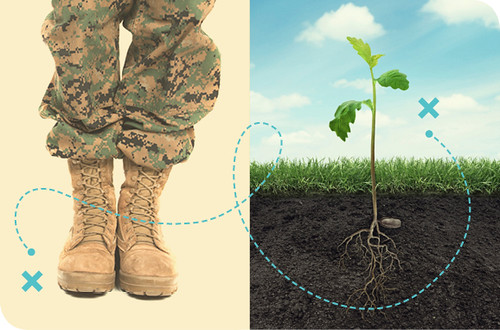
A professor in the Lone Star State is counting on two underrepresented groups to play a major role in the future of agriculture.
Ken Mix, assistant professor of agriculture at Texas State University (TSU), is the project director of a new program called “Boots to Roots,” a program that helps female and Hispanic military veterans to earn bachelor’s degrees in agriculture and other science, technology, engineering, and mathematics (STEM) degree programs.
The U.S. Department of Agriculture’s National Institute of Food and Agriculture (NIFA) is supporting Boots to Roots with a four-year, $275,000 grant under its Hispanic-Serving Institution (HSI) Education Grants Program. Boots to Roots was one of 25 HSI projects to receive a portion of $8.8 million awarded by NIFA on Oct. 20. Institutions with a minimum of 25 percent Hispanic enrollment qualify for HSI grants.
According to Mix, Boots to Roots appears to be the only USDA grant-supported program specifically for veterans to obtain Ag and STEM degrees. The National Center for Veteran Analysis and Statistics reported that women and Hispanic veterans consisted of 10 percent and 6 percent, respectively, of the total veteran population in 2012.
“Both of these demographics are underrepresented in the STEAM (STEM plus agriculture) disciplines,” Mix said. “Essentially, all agriculture is science-based, and the work ethic of veterans is extremely high – which will increase the success of this program and lead to additional opportunities for veterans.”
The students who participate in Boots to Roots will gain hands-on experience at TXState’s Students’ Sustainable Farm, engage in faculty-led and mentored undergraduate research, and present that research at conferences. They will also volunteer their services with community organizations and schools, including developing lessons and teaching agriculture or science to K-12 students.
A recent study by Purdue University reflects a critical need for programs such as Boots to Roots. The report shows the food, agriculture, renewable natural resources, and environment fields have about 57,900 high-skilled job openings annually. However, the report also shows there are only about 35,400 new U.S. graduates with a bachelor’s degree or higher in agriculture-related fields, a shortfall of about 22,500.
“It is crucial that HSIs embrace veterans as they look at educational opportunities in STEM and agricultural sciences,” said Irma Lawrence, national program leader for NIFA’s HSI program. “Grants such as this are a great way of saying thank you to vets for their contributions to protect the freedom that we enjoy. This program helps underrepresented veterans retrain and reintegrate themselves into their communities and help meet the nation’s STEM and agricultural sciences workforce demands.”
NIFA invests in and advances agricultural research, education and extension and seeks to make transformative discoveries that solve societal challenges.
